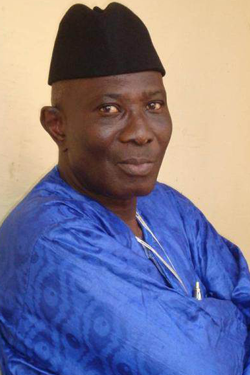Boubacar Toure embodied 'servant leadership'

Dr. Bouba Toure was killed in crash of
U.N. airplane in the Congo
Toure, 63, was the senior reproductive health adviser in the Congo for the International Rescue Committee (IRC). He is survived by his widow, Salamantou, four children and a grandchild.
Funeral services were held April 12 in Conakry, the capital of Guinea, his homeland. Attending, in addition to his widow, were three of his children Aisha, Hadjaline, and Abdoulaye Bienvenue, and his granddaughter Ramatoulaye.
His son Bienvenue is living in South Carolina where he is taking a year of intensive English training before he begins his studies at USC in the fall, the same program Toure followed before he began his studies at the Arnold School.
Toure was an internationally recognized leader in the maternal health field and was deeply committed to reversing high levels of maternal mortality in the Congo and other countries where he has worked. Known to most as "Bouba," Toure received his medical training at the First Institute of Medicine in Moscow in the 1970s. He spent much of his career in his homeland as an obstetrician and gynecologist.
Director of obstetrics and gynecology at Donka Teaching Hospital in Guinea, Toure was the National Coordinator of the Safe Motherhood Program in Guinea's Ministry of Health from 1992 – 1999.
He earned a master's degree in public health administration from the Arnold School in 2002 and then served three years as adjunct assistant professor.
Dr. Saundra Glover, the Arnold School's associate dean for health disparities and social justice, said Toure was an inspiration to many.
"In the faculty-student relationship, the anticipation is usually that the teacher will inspire the student. In the case of Bouba, it was the reverse," she said. "He was an inspiration to me and reminded me of why we can never giver up in our quest to lift those who are most vulnerable and underserved."
During his time at USC, Toure remained committed to returning to the Congo and dedicating his life to improving health services for women and girls, she said.
"I am grateful for our paths having intersected here at USC," Glover said. "Bouba lived the scripture, Hebrews 12:12, 'Therefore strengthen the hands which hang down, and the feeble knees, and make straight paths for your feet, so that what is lame may not be dislocated, but rather be healed.'
"Bouba embodied servant leadership in his public health career, and his legacy will continue through the women and girls whose lives he touched and made better," she said.
Dr. Jan Probst, a professor in the Department of Health Services Policy and Management, served as the faculty adviser for Toure's master's degree project on postpartum suicide.
"Dr. Toure had a burning commitment to maternal health that was evident in his research as he pursued his master of public health degree," she said. "His dedication to improving outcomes for women around the world will be difficult to replace."
Toure joined the IRC in the Congo in 2008 to oversee an extensive reproductive health care program in four war-impacted provinces. During his tenure, the program grew further in scale and became an international model.
At the time of his death, Toure was working with the Congolese Ministry of Health and with specialized agencies to provide training for hundreds of healthcare workers, said Ashley Wolfington, reproductive health specialist with the IRC and a close colleague.
Toure had been trying to rebuild part of the Congolese healthcare system that was destroyed by 10 years of extreme violence, massive population displacement, widespread rape, and the collapse of public health services.
Wolfington said Toure focused on improving healthcare for women and girls, whose health needs have suffered particularly because of the crisis.
Toure's efforts have increased access to emergency obstetrics, family planning and other vital services and also ensured that hospitals and remote clinics were supplied with life-saving medicines.
Co-workers and those who participated in his training sessions, recall his bright wit and the infectious passion in the cause of improving access to reproductive health services.
"Dr. Toure devoted his life to improving health services for women and girls," said George Rupp, the IRC's president. "His dedication was apparent to all who met him."
During his career, Toure, who spoke some 11 languages, lectured at universities and gave presentations on reproductive health issues around the world. In 2010, he was a featured panelist at a U.S. State Department conference in Washington, D.C., during which he discussed the unique health needs of women and girls in conflict zones, and, in particular, stressed the need for resources to respond to complications in pregnancy and childbirth in settings such as the Congo.
"Our heart goes out to Dr. Toure's family, friends and colleagues around the world who knew and admired him," said Ciaran Donnelly, the IRC's regional director in Congo. "His humanity and vibrant spirit were an inspiration to us all."



_01.jpg)